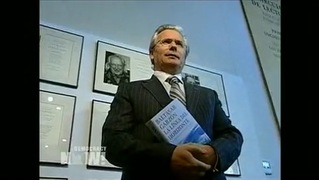
Guests
- Emilio Bandaa student union leader in Chile. In 1987, he was arrested by Pinochet forces and imprisoned for six months where he was tortured. He left Chile in 1993.
- Francisco Letelierson of Orlando Letelier, who was a high-ranking government official in Chile under President Allende. Following the coup, Letelier was imprisoned and tortured. He moved to the United States after his release. In September of 1976, Orlando was killed, along with his American colleague Ronni Moffitt, when a bomb planted under his car exploded as they rode to work. The assassination was eventually traced back to Pinochet’s regime.
- Peter Kornbluhauthor of The Pinochet File: A Declassified Dossier on Atrocity and Accountability. He is a senior analyst at the National Security Archive, a public-interest documentation center in Washington.
Former Chilean dictator Augusto Pinochet died on Sunday at the age of 91. He took power in a U.S.-supported coup on September 11, 1973, and ruled Chile for 17 years. During that time, his government murdered or disappeared more than 3,200 people. Tens of thousands were also tortured, including Michelle Bachelet, Chile’s current president. We speak with Emilio Banda, a student union leader who was tortured under Pinochet’s reign; Francisco Letelier, the son of Chilean diplomat Orlando Letelier, who was killed in car bomb in Washington, D.C.; and with Peter Kornbluh, author of “The Pinochet File: A Declassified Dossier on Atrocity and Accountability.” [includes rush transcript]
Former Chilean dictator General Augusto Pinochet died on Sunday at the age of 91. Pinochet came to power in a bloody CIA-backed military coup on September 11th, 1973 that overthrew the democratically-elected president Salvador Allende. He ruled Chile for 17 years marking one of South America’s longest- lasting and most repressive regimes. Pinochet oversaw the killing of over 3,000 Chileans during his brutal military reign. More than 30,000 Chileans have testified that they were tortured or detained by the military government.
Salvador Allende’s daughter, Isabel Allende, spoke after hearing the news of Pinochet’s death.
- Isabel Allende, daughter of former Chilean President Salvador Allende: “I demand justice and I am willing to re-encounter myself with the country and its memory under these values. Never again a coup, never again more violations of Human Rights, never again more assassinations.”
Pinochet has repeatedly evaded punishment for his crimes. In October 1998, he was arrested during a visit to London following an extradition request from Spain, where judge Baltasar Garzon was investigating Pinochet’s involvement in murders tied to his regime. Pinochet was held under house arrest for 16 months. But the British government allowed him to go back to Chile in March of 2000, saying he was too frail to face trial. Then in 2001, he was indicted for the so-called Caravan of Death–a mobile death squad responsible for the executions of 75 political prisoners. But Pinochet narrowly escaped facing charges after a Supreme Court ruled that he was physically and mentally unfit to stand trial.
In 2004, Pinochet was indicted for tax evasion and corruption after it was revealed that he had millions of dollars hidden in secret off-shore bank accounts. And in October, a federal judge in Chile ordered his arrest for carrying out 36 cases of kidnappings and 23 cases of torture at a secret prison.
Earlier this month, Pinochet was hospitalized after suffering a heart attack. Almost immediately after his death was announced on Sunday, thousands took to the streets in Santiago to celebrate. Clashes broke out when a group of about 1,000 people tried to head towards the city’s presidential palace. Police used water cannon and tear gas to disperse the crowds.
Last month, we * interviewed* Chilean novelist Isabel Allende here on Democracy Now! She is the niece of Chile’s former president, Salvador Allende. Juan Gonzalez asked Isabel her reaction to a statement Pinochet issued on his 91st birthday saying he will not apologize to the Chilean people for what happened under his rule.
- Isabel Allende, author and niece of former Chilean President Salvador Allende: “There has not been justice in Chile. Justice is very slow and not fair, blind, deaf. And the people who suffered during that time suffered in silence. Their suffering was never acknowledged. It was denied. Then we had democracy for many years, and the idea was that in order to protect this fragile condition, democracy, that suffering had to be put aside. Those people had to sacrifice their truth and their past and their losses. And so, now it’s too late, and Pinochet will never be arrested. He lives in perfect comfort and wealth. And I don’t think that by apologizing to the people that he so awfully tortured and whose lives he destroyed, he will do any good.”
Today we host a roundtable discussion on the death and legacy of Augusto Pinochet:
- Emilio Banda, a student union leader in Chile. In 1987, he was arrested by Pinochet forces and imprisoned for six months where he was tortured. He left Chile in 1993.
- Francisco Letelier, his father, Orlando was a high-ranking government official in Chile under President Allende. Following the coup, Letelier was imprisoned and tortured. He moved to the United States after his release. In September of 1976, Orlando was killed, along with his American colleague Ronni Moffitt, when a bomb planted under his car exploded as they rode to work. The assassination was eventually traced back to Pinochet’s regime.
- Peter Kornbluh, author of “The Pinochet File: A Declassified Dossier on Atrocity and Accountability.” He is a senior analyst at the National Security Archive, a public-interest documentation center in Washington.











Media Options